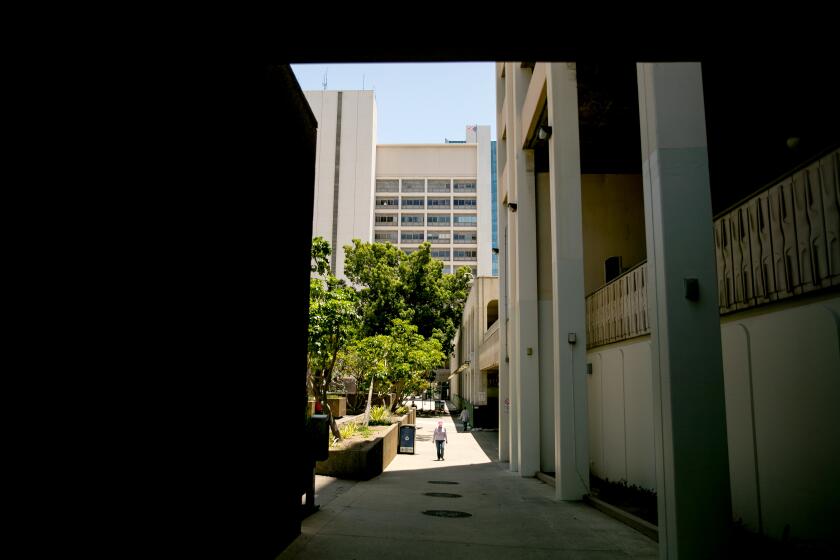San Diego leaders will challenge state law prohibiting race, gender preferences in contracting

SAN DIEGO â Two City Council members say they want San Diego to become the first city in California to successfully challenge a state law prohibiting cities from giving preferential treatment to women and people of color when awarding contracts.
The plan to challenge voter-approved Proposition 209 comes in the wake of a disparity study released last summer that showed women and people of color donât get their fair share of the billions of dollars that San Diego awards in city contracts.
This story is for subscribers
We offer subscribers exclusive access to our best journalism.
Thank you for your support.
Businesses owned by white women and minorities received only 19% of $2.2 billion in city contracts awarded during a five-year period analyzed in the study, compared with the 31% the study says they should have landed.
City leaders say such a stark disparity calls for aggressive action, but Proposition 209 prohibits discrimination or preferential treatment in public contracting based on sex, color, ethnicity or national origin.
The proposition, which voters approved in 1996, says gender or racial preferences are only allowed if they are narrowly tailored and there is a compelling government interest in having such preferences.
When cities have tried to create preferential programs that meet Proposition 209âs strict requirements, they have failed. For example, the state Supreme Court ruled against a San Jose law requiring âparticipation goalsâ and âtargeted outreach.â
In a legal memo issued last summer, City Atty. Mara Elliott cautioned against challenging the proposition because the San Diego study didnât find evidence that âintentional discriminationâ played a role in the cityâs disparities.
Council members say city should pursue bold remedies despite potential legal hurdles
âAlthough the study revealed disparities in some categories of contracting, there is no evidence of intentional discrimination that would permit the establishment of a program that targets persons with protected characteristics, such as race or gender,â Elliott wrote.
City staff agreed with Elliott in a recent staff report. âStaff does not believe the implementation of additional, mandatory race and gender-conscious measures within the cityâs contracting programs is appropriate at this time,â said Claudia Abarca, director of the cityâs Purchasing and Contracting Department.
Councilmembers Raul Campillo and Monica Montgomery Steppe say they want to push against the state law anyway.
âThe city of San Diego must take aggressive action to address these disparities through the creation of race and gender-conscious contracting programs,â Campillo said. âFor over 30 years we have allowed these inequities to exist in our cityâs contracting policies, and itâs time to right this wrong.â
Campillo acknowledged that the effort must be carefully handled, adding that he and Montgomery Steppe will work closely with Elliott and the cityâs Purchasing and Contracting Department.
âThis program will need much additional analysis to ensure it is narrowly tailored to address specifically the most severely underrepresented groups in city contracting,â he said.
The 659-page city study, which was created by BBC Research and Consulting, found that white women received 36% of the contracts they were capable of handling based on what portion they make up of the local contracting industry.
Black and Native American contractors got only 20% of the contracts they were capable of handling. Hispanics and Asians from Pacific islands both received 94% of what they were capable of handling.
On the other end of the spectrum, Asians not from Pacific Islands landed more city contracts than they would have been expected to get based on their share of the local contracting industry overall.
Campillo said heâs committed to proposing race- and gender-conscious programs that serve a compelling government interest. He also will provide evidence that the cityâs contracting program has been unable to adequately capture the local market.
Meanwhile, the councilâs economic development committee approved more than a dozen new contracting policies last week that are neutral regarding gender and race but still aim to help women and contractors of color.
Because the vast majority of minority and women contractors are small contractors, city officials said programs that help small contractors can help these groups without any gender or race provisions.
The new policies include dividing large contracts so that smaller companies have the capacity to fulfill them, reducing bonding requirements some businesses canât afford and increasing outreach to businesses owned by women and people of color.
Another new policy is ensuring that city officials promptly pay contractors, because small businesses typically have more narrow bottom lines, making it a larger challenge to wait many months for such payments.
The city is also creating a special subcommittee, which will include some local contractors, to determine whether the city has accurately analyzed how many contractors are available to handle city work.
The finding in the city disparity study that women and people of color could handle 31% of city contracts has been disputed by some, so one goal of the subcommittee is to discern whether that number is correct â or potentially adjusting it.
Outreach efforts in place for construction contracts will be extended to contracts for goods and professional services, such as consulting. Construction contracts account for 62% of what San Diego spends on contracts, while professional services account for 31% and goods account for 7%.
The city disparity study, which cost $500,000, covered the fiscal years 2015 through 2019.
An unrelated city audit in 2020 found that San Diego needs to sharply revamp its race- and gender-neutral efforts to boost the number of city contracts awarded to minorities and women.
Shortcomings of decade-old incentive might prompt major changes, including a more formal leg up
The audit found that an incentive program to get more small businesses involved in city contracting has not accomplished its goals. The audit also found that the lionâs share of the businesses that participate in the program are white-owned.
More to Read
Sign up for Essential California
The most important California stories and recommendations in your inbox every morning.
You may occasionally receive promotional content from the Los Angeles Times.












